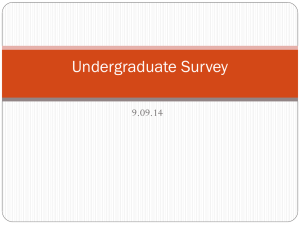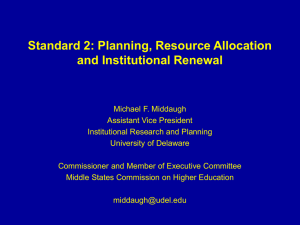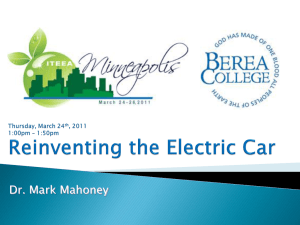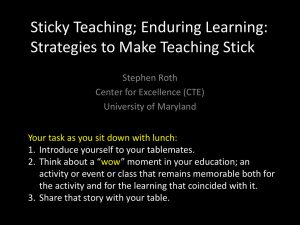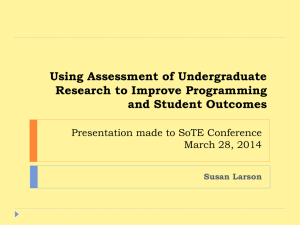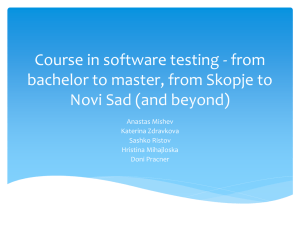Reading Compliance Through - Schreyer Institute for Teaching
advertisement
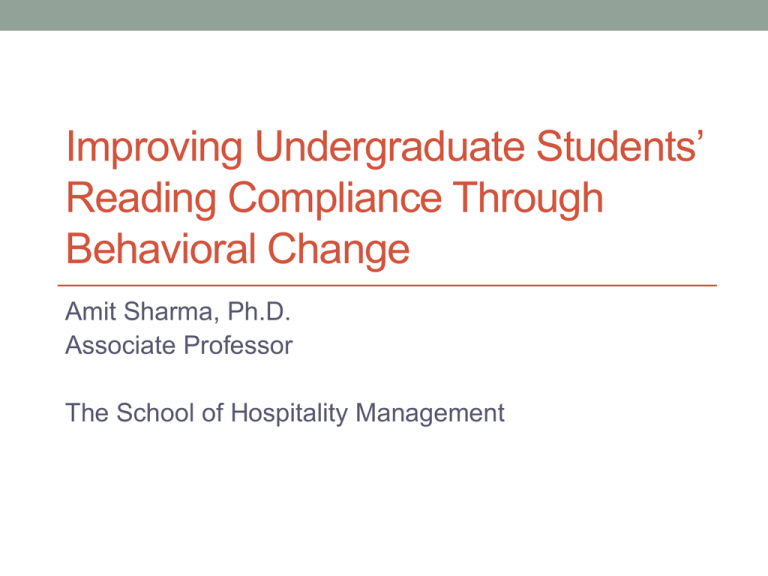
Improving Undergraduate Students’ Reading Compliance Through Behavioral Change Amit Sharma, Ph.D. Associate Professor The School of Hospitality Management Purpose • The purpose of this project is to evaluate, and improve undergraduate students’ reading compliance decisions: • 1) improve understanding of factors that impact undergraduate student reading compliance; and • 2) develop strategies to help students improve time self- rationing skills, increase positive perceptions of reading assignments through awareness of longer-term benefits. • Funding: Schreyer Institute for Teaching Excellence (Sharma, PI) Motivation for this research • Observation of student behavior and attitude towards reading material. • Informal strategies in class since 2008 – Facebook, Twitter, in-class readings, pop-quizzes, etc. • Related research in self-rationing and decision making. Reading Compliance • Third Grader reading challenges (McCray, Vaughn, & Neal, 2001). • Reading compliance amongst undergraduate students is as low as 20-30% for daily reading assignments (Hobson, 2004). • Low reading compliance impacts scholarly performance of undergraduate students (National Survey of Student Engagement, 2001). • Previously held beliefs that undergraduate students possess appropriate reading abilities being challenged (Bean, 1996). • Student perspective on reading compliance can be valuable to consider (Ivey and Broaddus, 2001). Theoretical Framework • Behavioral economics literature - individuals could be inefficient in self-rationing (self-regulating) resources (Heath & Soll, 1996; Wertenbroch, 2001). • Time is a valuable economic resource. • Individuals’ ability to make complex decisions of resource allocation to activities with abstract immediate benefits, are limited (Fujita, Trope, Liberman, & Levin-Sagi, 2006). • We hypothesize - students can improve reading compliance by improving time self-rationing decisions; and by increased awareness of short-long term benefits of reading compliance. The Project • Planning, Phase I – Understanding factors that impact reading compliance – today’s presentation - part of Phase I. • Development, Phase II – Development of strategies to improve reading compliance. • Implementation and Validation, Phase III – Effectiveness of strategies, and evaluation. Research Design • Research Objective – Phase I: Improve understanding of factors that impact undergraduate student reading compliance. • Undergraduate student focus group discussions • Recruitment challenges: university wide, HHD, SHM • Initially planned three focus groups; concluded with two focus groups, total 12 students • Students from SHM HHD Data and Analysis • Discussion questions (literature review): reading compliance factors, incentives-penalties, procrastination, time management, support. • Focus groups conducted by Dr. Bart Pursel (SITE) to minimize bias. • Graduate student present to take notes • Audio recorded discussions, one hour each, transcribed. • Transcriptions read by three researchers (Sharma, Pursel, and Van Hoof); Meeting and discussion of transcripts. Content analysis to identify key concepts. • Concept maps to assess patterns, relationships… Concept Map Coding • Bold – Concepts appear repeatedly shaded concepts – More than 1 relationship Overall Concept Map Reading Compliance Procrastination Incentives-Penalties Reading Support Concepts of Interest • Reading compliance • Challenges – Time consuming, book availability • Could encourage completion – Short quizzes, in-class discussions, interesting and recent readings, called upon in class • Motivations to complete – Interest in subject, participation grade • Incentive-disincentive • Incentives versus disincentives? • Short term benefits – Helps understand materials, participation grade • Choice depends upon – interesting, short quizzes, teacher follow through, busy schedule, semester timing (??) • Long term benefits – ??? Concepts of Interest • Procrastination • Reading timing – Night before, 15 minutes before class • More if – Teachers don’t follow through, semester timing • Less if – Professor personality, busy schedule, if book in library reserve, shorter assignments • Support and time management • Support – May not make a difference, printed materials • Reminders – Emails only, no Facebook or text messages • Time required for reading – Not too long, one hour • Time management – Self learned • Best place to read - Library Concepts of Interest – prior literature • Surprise quizzes, illustrate practical benefits of reading preparation, emphasize students' responsibility (Sappington, Kinsey, and Munsayac, 2002). • Reading guidelines, structure, graded reading assignments, class discussions, participation grades, relevance to professional development (Janick-Buckner, 1997; Gross Davis, 1999; Monaco and Martin, 2007). • Timely assignment of readings (Gross Davis, 1999); Variety of reading materials (Ivey and Broaddus, 2001); Millennial generation learning techniques: technology pressured (Wilson, 2004; Considine, Horton, and Moorman, 2009) Questions of Interest • Reading compliance • What are the perceptions and attitudes of students? • What is the magnitude of this problem? • What are students’ challenges that prevent them from complying? • How could instructors encourage compliance? • What are the motivations to comply? • Incentive-disincentive • What works better, incentives or disincentives? Or Both? • What are the perceived short term benefits? • What are the perceived long term benefits? • How do students choose between reading assignments? Questions of Interest • Procrastination • How can students be encouraged to read sooner than the night before or 15 minutes before class? • Support and time management • Would support make a difference? If so, what kind of support? • Such as, reminders, special skills to manage course work and nonacademic activities, etc. • Others • What are the millennial generation factors that may impact compliance? • How can this impact by reduced/minimized/countered? Next Research Phases • Planning, Phase I (continued) - University wide survey of undergraduate students, develop strategies to improve reading compliance decisions. • Development, Phase II – Develop interventions and experimental design for selected courses. • Implementation, validation, Phase III – Implement and test effectiveness of strategies in courses taught by the PI and collaborators. Research Team • Amit Sharma, PI • • • • • • • • • • Collaborators (Alphabetically): Lisa Bailey-Davis, M.S., R.D. (Senior Instructor, Hershey) Dave Cranage, Ph.D. (Associate Professor, SHM) Martha Conklin, Ph.D. (Associate Professor, SHM) Rick Gilmore, Ph.D. (Associate Professor, Psychology) Kathy Jackson, Ph.D. (Senior Research Associate, SITE) Kyle Peck, Ph.D. (Associate Dean - Research, Education) Bart Pursel, Ph.D. (Research Associate, SITE) Rama Radhakrishna, Ph.D. (Professor, Ag. Sc.) Bert Van Hoof, Ph.D. (Professor, SHM) • Special thank you to R. Neill Johnson, Ph.D. (Formerly SITE) Questions for the audience • Is reading compliance an issue in your classes? • Do you think it needs to be addressed during students’ undergraduate experience? • Can you think of other issues that come to mind, that may impact reading compliance for this generation of students? • Any strategies that you have found successful? • Any suggestions or comments on this presentation, and the research so far? Thank You. Q&A Theoretical Framework • Construal Level Theory (CLT) and Mental Accounting (MA) (Thaler, 1985; Fujita et al., 2006). • Behavioral economics literature - individuals could be inefficient in self-rationing (self-regulating) resources (Heath & Soll, 1996; Wertenbroch, 2001). • Time is a valuable economic resource. • Individuals’ ability to make complex decisions of resource allocation to activities with abstract immediate benefits, are limited (Fujita, Trope, Liberman, & Levin-Sagi, 2006). Theoretical Framework • We hypothesize that students can improve reading compliance by improving their time self-rationing decisions; and appreciating short and long term benefits of reading compliance. Concepts of Interest – prior literature • Consider surprise quizzes, illustrate practical benefits of reading preparation, and emphasize students' responsibility in the learning enterprise (Sappington, Kinsey, and Munsayac, 2002). • Reading guidelines, graded reading assignments, class discussions, participation grades, relevance to professional development (Janick-Buckner, 1997; Gross Davis, 1999). • Timely assignment of readings (Gross Davis, 1999). Concepts of Interest – prior literature • Variety of reading materials (middle school students) (Ivey and Broaddus, 2001). • Millennial generation learning techniques: technology (Wilson, 2004; Considine, Horton, and Moorman, 2009); pressured • Structure in learning (Monaco and Martin, 2007). Concepts of Interest – prior literature • Millennial generation learning techniques: technology pressured (Wilson, 2004; Considine, Horton, and Moorman, 2009)

